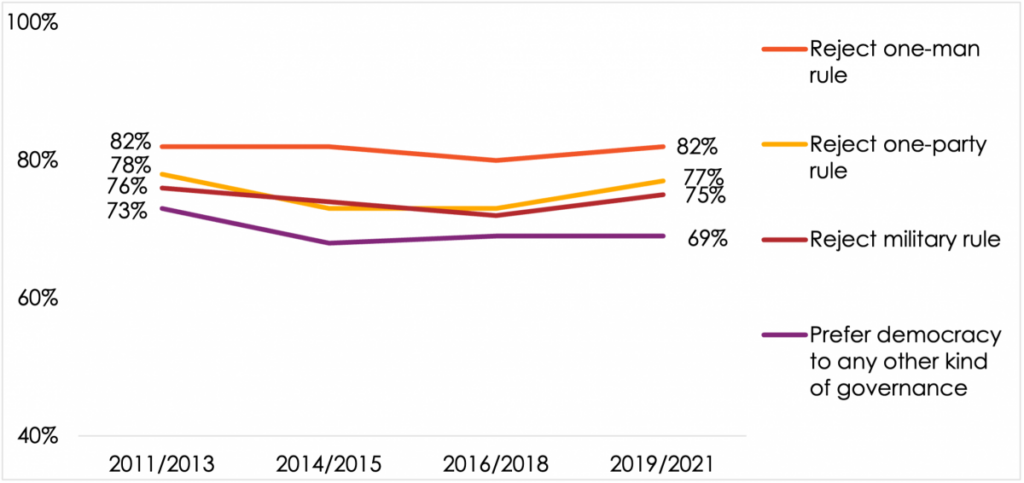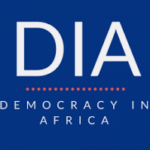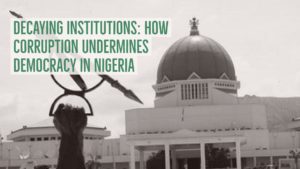At last week’s U.S.-Africa Leaders Summit, Senegalese President Macky Sall, the African Union chairman, thanked President Biden for his commitment to Africa, AP reports. But he also criticized pending U.S. legislation that he said unfairly “targeted” Africa, an apparent reference to a measure titled “Countering Malign Russian Activities in Africa.”
 The summit sought to counter China’s growing influence on the sub-continent, but Russia also seeks to degrade the model of democratic governance through the cooption of isolated African leaders, notes Joe Siegle, Director of Research at the National Defense University’s Africa Center for Strategic Studies.
The summit sought to counter China’s growing influence on the sub-continent, but Russia also seeks to degrade the model of democratic governance through the cooption of isolated African leaders, notes Joe Siegle, Director of Research at the National Defense University’s Africa Center for Strategic Studies.
To prevent another “Scramble for Africa,” the continent’s leaders must be more imaginative and proactive in pooling their efforts and setting the agenda, argues Foreign Policy columnist Howard W. French.
Dave Peterson, senior Africa director at the National Endowment for Democracy (NED), told VOA that the summit largely addressed some of the challenges facing Africa today, adding that real impact will be felt by ‘’everybody’’ if implemented.
‘’It’s a matter of follow-up and implementation,’’ he said while noting ‘’disappointments’’ by some civil society groups who felt they were not engaged.
 African governments can recommit themselves to meaningful democratization by sustaining effective democratic institutions, improving governance, strengthening accountability mechanisms, addressing marginalization, and expanding the space for political participation and citizen engagement, said Tiseke Kasambala (right), Africa Programs Director at Freedom House.
African governments can recommit themselves to meaningful democratization by sustaining effective democratic institutions, improving governance, strengthening accountability mechanisms, addressing marginalization, and expanding the space for political participation and citizen engagement, said Tiseke Kasambala (right), Africa Programs Director at Freedom House.
Some 70% of Africans believe democracy is the ideal form of government, according to a 2021 survey from NED grantee Afrobarometer.
 The Chinese government has heavily subsidized 5G telecommunications companies like Huawei as they have gained global dominance, adds Mark Kennedy, Director of the Wahba Institute for Strategic Competition at the Wilson Center for International Scholars. This not only precludes economic opportunities for Western providers but leaves Africa vulnerable to Chinese spying because China’s manufacturers are subject to its extensive data access laws, he writes for The Hill.
The Chinese government has heavily subsidized 5G telecommunications companies like Huawei as they have gained global dominance, adds Mark Kennedy, Director of the Wahba Institute for Strategic Competition at the Wilson Center for International Scholars. This not only precludes economic opportunities for Western providers but leaves Africa vulnerable to Chinese spying because China’s manufacturers are subject to its extensive data access laws, he writes for The Hill.
The growing African middle class is vocal in demanding services, which “should create a sense of urgency to address those needs,” Alain Ebobissé, the CEO of Africa50, an organization charged with helping bridge Africa’s infrastructure funding gap, told Devex’s Adva Saldinger. @AdvaSal
 Instead of fixating on infrastructure, African countries should look to the experience of Latin American countries with similar resource endowments: a greater relative abundance of land than low-cost labor, says Kenyan economist David Ndii. As this experience shows, countries can make far more durable, sustainable economic gains by focusing on improving agricultural productivity with relatively low-cost improvements targeted at smallholder farmers for whom a boost in productivity would have the largest impact, he writes for Carnegie.
Instead of fixating on infrastructure, African countries should look to the experience of Latin American countries with similar resource endowments: a greater relative abundance of land than low-cost labor, says Kenyan economist David Ndii. As this experience shows, countries can make far more durable, sustainable economic gains by focusing on improving agricultural productivity with relatively low-cost improvements targeted at smallholder farmers for whom a boost in productivity would have the largest impact, he writes for Carnegie.
The survival of democracy is being challenged in the aftermath of recent set-backs in Mali, Guinea and Burkina Faso, said Nigerian President Muhammadu Buhari (above).
 As Africa’s largest democracy, the regional stakes of Nigeria’s upcoming elections are high, as peaceful, credible elections would go far in shaping the democratic trajectory of the entire continent, he told a forum co-hosted by USIP, the National Democratic Institute, the International Republican Institute, the National Endowment for Democracy, and the International Foundation for Electoral Systems. As he approaches the end of his second and final term in office, he affirmed his desire to not just sustain Nigeria’s longest period of uninterrupted democracy at the polls, but to see it revitalized.
As Africa’s largest democracy, the regional stakes of Nigeria’s upcoming elections are high, as peaceful, credible elections would go far in shaping the democratic trajectory of the entire continent, he told a forum co-hosted by USIP, the National Democratic Institute, the International Republican Institute, the National Endowment for Democracy, and the International Foundation for Electoral Systems. As he approaches the end of his second and final term in office, he affirmed his desire to not just sustain Nigeria’s longest period of uninterrupted democracy at the polls, but to see it revitalized.







